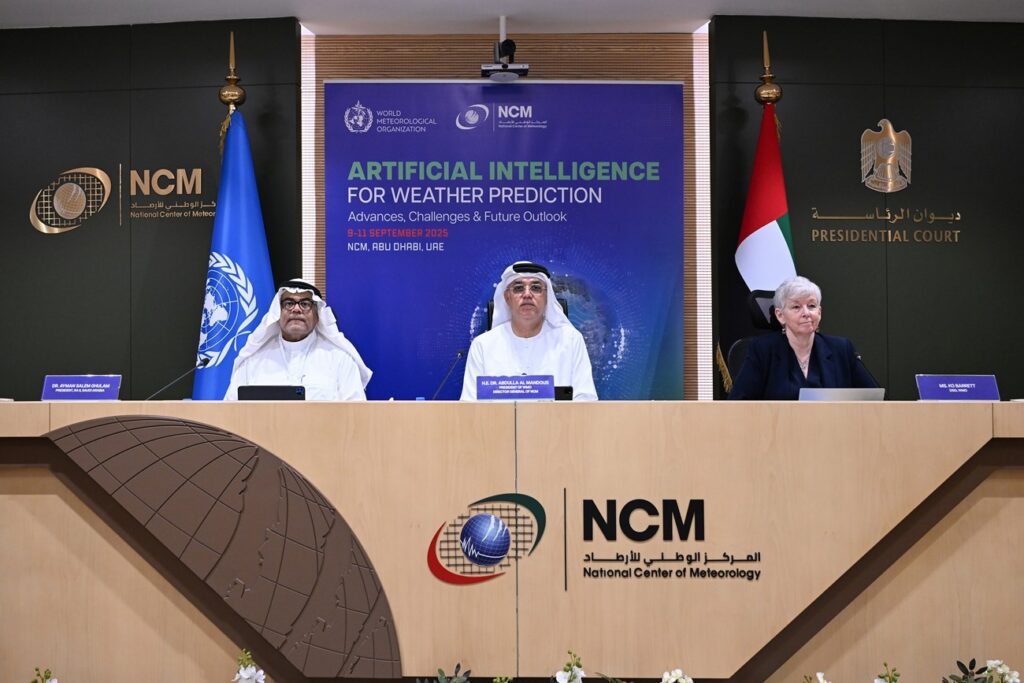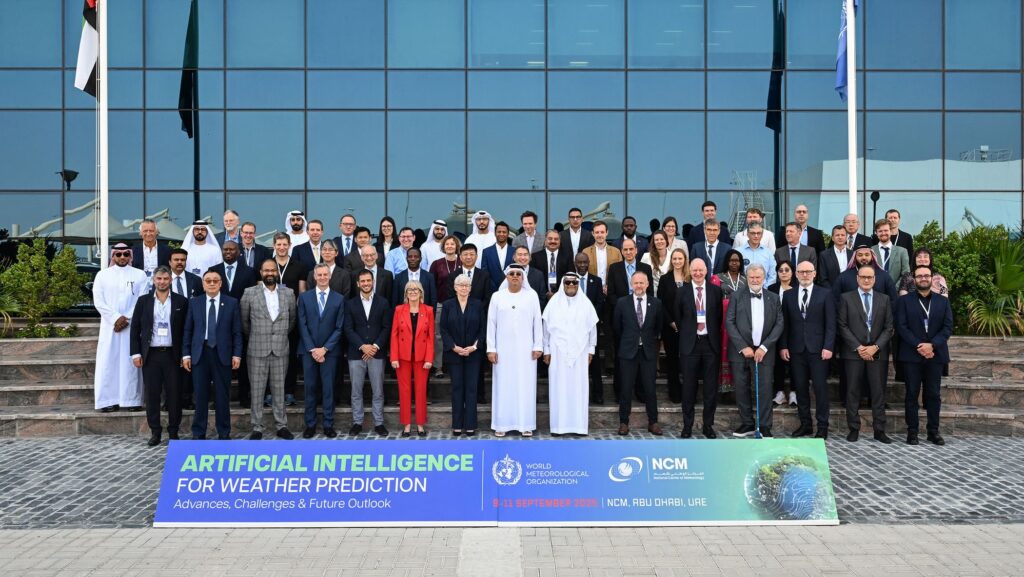The Artificial Intelligence Conference on Weather Prediction has officially kicked off in Abu Dhabi, bringing together global experts to discuss how AI is transforming the way weather is forecasted and monitored. The three-day event, held at the National Centre of Meteorology, is one of the most anticipated gatherings in the field of meteorology and climate science. Its goal is to explore the latest technological innovations, share knowledge, and establish collaborations that can revolutionize weather prediction across the globe.
This conference is especially significant at a time when climate change is causing increasingly unpredictable weather patterns, from extreme heatwaves to intense rainfall and storms. Accurate weather forecasting has never been more critical, and artificial intelligence is emerging as a powerful tool to enhance predictive capabilities.
A Global Gathering of Experts
The Artificial Intelligence Conference on Weather Prediction has drawn more than fifty experts from multiple disciplines, including meteorology, AI research, data science, and policy-making. Participants include scientists from research institutions, technology developers, government agencies, and private companies. The event provides a platform to share cutting-edge research, discuss challenges, and explore practical applications of AI in forecasting.

The conference encourages collaboration between different sectors, combining theoretical research with real-world applications. Workshops, panel discussions, and live demonstrations give attendees the opportunity to exchange ideas, learn from each other’s experiences, and develop solutions to pressing weather-related challenges.
The Role of AI in Modern Weather Forecasting
Artificial intelligence is changing the way meteorologists approach forecasting. Traditional methods rely on complex numerical models that simulate atmospheric conditions, but these models are often limited by the sheer complexity of weather systems and the computational power required. AI, particularly machine learning algorithms, allows researchers to analyze massive datasets from sources such as satellites, radar systems, and historical weather data to uncover patterns and make more precise predictions.

One of the key benefits of AI in weather prediction is its ability to deliver high-resolution, short-term forecasts, known as nowcasting. These forecasts are essential for sectors like agriculture, transportation, and emergency management, where timely information can prevent losses and save lives. AI-powered nowcasting can quickly process vast amounts of data, identify trends, and provide actionable insights faster than traditional models.
Enhancing Disaster Preparedness and Response
The Artificial Intelligence Conference on Weather Prediction highlights how AI is helping improve disaster management. Severe weather events such as hurricanes, floods, and sandstorms pose serious risks to communities and infrastructure. By using AI, authorities can generate accurate forecasts that allow for early warning systems, emergency evacuations, and better resource allocation.
AI models can integrate multiple data sources, including river levels, wind patterns, and population density, to assess risk and predict the potential impact of extreme events. This information supports better decision-making, helping governments and organizations prepare for a range of scenarios and reduce uncertainty during emergencies.
Revolutionizing Cloud Seeding and Water Management
Cloud seeding is another area where AI is making a difference. This technique aims to enhance rainfall by dispersing particles into clouds, which can be especially valuable in regions with limited water resources. AI enables meteorologists to analyze real-time atmospheric data and identify optimal times and locations for cloud seeding operations. This improves efficiency and maximizes results while minimizing environmental impact.
Beyond cloud seeding, AI is also being applied to broader water management strategies. By predicting rainfall patterns, droughts, and water scarcity events, AI helps authorities plan irrigation, water distribution, and reservoir management. This ensures better support for agriculture, urban planning, and resource conservation, contributing to overall sustainability.

Addressing Challenges in AI Weather Prediction
Despite its promise, integrating AI into weather forecasting presents challenges. Reliable forecasts require high-quality, comprehensive datasets, which are not always available in all regions. Data gaps or inaccuracies can affect the performance of AI models, emphasizing the importance of robust data collection networks.
Another challenge is the interpretability of AI predictions. Machine learning models can act as black boxes, providing outputs without clear explanations. For meteorologists, understanding how a forecast is generated is critical for trust and practical application. Researchers are developing methods to make AI outputs more transparent and explainable, which will improve their adoption in operational forecasting systems.
Ethical considerations are also important. AI models must be designed to avoid bias and ensure fairness, especially when forecasts are used for emergency response planning. Making AI-driven forecasts accessible to all communities, including vulnerable populations, is a central concern of the conference.
Opportunities for Innovation
The Artificial Intelligence Conference on Weather Prediction explores numerous opportunities for innovation. Advances in deep learning, reinforcement learning, and predictive analytics are expected to improve both short-term and long-term forecasting accuracy. Combining AI with Internet of Things networks, drones, and high-resolution satellite imagery will generate richer datasets and more detailed predictions.
Collaboration is key to unlocking AI’s full potential. By sharing knowledge and creating standards for data collection and analysis, stakeholders can accelerate the practical application of AI in weather services. Regional-specific AI solutions can address local challenges, from monsoon flooding to desert storms, ensuring tailored, effective forecasting.
Training the next generation of meteorologists and data scientists is another focus of the conference. Programs combining atmospheric science with AI and analytics are essential for equipping professionals to work with advanced technologies and address evolving climate challenges.
Societal and Economic Benefits
Artificial intelligence in weather prediction has far-reaching societal and economic impacts. Accurate forecasts protect lives, reduce property damage, and prevent economic losses from extreme weather. Businesses can plan operations, supply chains, and energy use more effectively when forecasts are precise.
In agriculture, AI-driven predictions guide planting schedules, irrigation, and crop protection, helping farmers increase yields and reduce losses. Urban planners use forecasts to design infrastructure resilient to climate variability. Even tourism, transportation, and energy sectors benefit from timely weather information, illustrating the broad impact of AI-enhanced meteorology.

Abu Dhabi as a Hub for AI Innovation
By hosting the Artificial Intelligence Conference on Weather Prediction, Abu Dhabi reinforces its position as a regional hub for technological and scientific innovation. Investments in research institutions, data infrastructure, and smart technologies support the city’s efforts to become a leader in AI and climate solutions.
The National Centre of Meteorology, the event’s host, provides a platform for collaboration and knowledge exchange. Its facilities allow experts to conduct workshops, demonstrate new technologies, and develop practical solutions that can be implemented regionally and globally.
Conclusion
The Artificial Intelligence Conference on Weather Prediction in Abu Dhabi represents a major step forward in the integration of AI into meteorology. By bringing together international experts, fostering innovation, and highlighting practical applications, the event demonstrates the transformative potential of AI in weather forecasting.
From improving disaster response and water management to advancing cloud seeding and predictive modeling, AI is revolutionizing how society prepares for and responds to weather events. As the world faces increasingly complex climate challenges, AI-enabled forecasting offers the accuracy, speed, and insights needed to protect lives, sustain economies, and build resilient communities.
The conference underscores that artificial intelligence in weather prediction is not just a technological advancement, it is a societal necessity. By leveraging AI responsibly and collaboratively, the global community can better understand, anticipate, and respond to the forces of nature, creating a safer, more sustainable future for all.
Do follow UAE Stories on Instagram
Read Next – Sharjah Sports Council Strengthens Cooperation with UAE Athletics Federation












